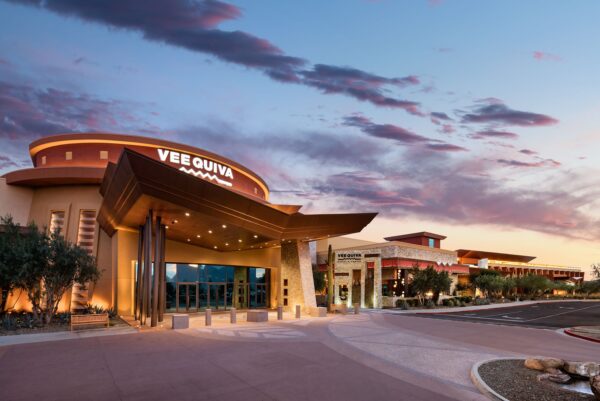
- Details
- By Native News Online Staff
CHANDLER, Ariz. — Five weeks after reopening its casinos, Gila River Gaming Enterprises Inc. temporarily closed three facilities for two weeks as COVID-19 cases are on the rise in Arizona.
The Gila River Indian Community said it opted to again close the properties, citing the rising COVID-19 case numbers in Arizona, following a review of its safety plan and feedback from the community and team members. The tribe operates casinos in Wild Horse Pass, Lone Butte and Vee Quiva.
“Nothing is more important to our Community than the well-being of our team members and guests, children, elders and families,” Gila River Indian Community Gov. Stephen Roe Lewis said in a statement. “Like our sister tribes and businesses all over Arizona, we have tried to do what is best for all, while processing new information and new guidelines about the pandemic with little in the way of definitive guidance.”
The temporary casino and hotel closures, effective as of Thursday, June 18, came less than five weeks after the Gila River Indian Community’s hotel and casino operations reopened in central Arizona. The casinos were closed from mid March through May 15.
As well, a security guard at the Lone Butte Casino died June 11 after suffering complications from COVID-19, according to a report in the Arizona Republic, which noted Gila River Gaming declined to disclose the number of employees who have tested positive.
In a statement to Casino.org, Gila River Gaming said it was unknown if the employee contracted the virus at work, and the organization’s contact tracing revealed that none of his co-workers tested positive.
At the time of Gila River Hotels & Casinos’ mid-May reopening and through the end of that month, Arizona was reporting fewer than 600 confirmed new cases of COVID-19 per day. The number of new confirmed cases spiked throughout the month of June, reaching a daily average of 1,549 through June 20, according to a Native News Online analysis of Arizona Department of Health Services data.
About 57 percent of all confirmed COVID-19 cases in Arizona were reported from June 1-20. The state reported its first case on Jan. 22.
Gila River Gaming plans to closely monitor the COVID-19 cases during the two-week shutdown and “re-examine every aspect of its operation,” including disinfection procedures, social distancing measures, health checks, testing protocols, masking and how best to protect workers and guests.
All employees of the Gila River Hotels & Casinos at Wild Horse Pass, Lone Butte and Vee Quiva will receive their full pay and benefits despite the temporary closure, according to a statement.
Gila River Gaming Enterprises also canceled and refunded hotel reservations at its Wild Horse Pass and Vee Quida properties through July 19.
More Stories Like This
American Basketball Association Announces Native ABA InitiativeFour Winds South Bend Upgrades to Class III Gaming Casino
Native News Online Wins Two Awards from Native American Journalists Association
Wahlberg Brothers Are a Big Hit at Indian Gaming Tradeshow and Convention in Las Vegas
Native Gro Offers Tribes a ‘One-Stop Shop’ for Entering the Cannabis Industry
Help us defend tribal sovereignty.
At Native News Online, our mission is rooted in telling the stories that strengthen sovereignty and uplift Indigenous voices — not just at year’s end, but every single day.
Because of your generosity last year, we were able to keep our reporters on the ground in tribal communities, at national gatherings and in the halls of Congress — covering the issues that matter most to Indian Country: sovereignty, culture, education, health and economic opportunity.
That support sustained us through a tough year in 2025. Now, as we look to the year ahead, we need your help right now to ensure warrior journalism remains strong — reporting that defends tribal sovereignty, amplifies Native truth, and holds power accountable.
 The stakes couldn't be higher. Your support keeps Native voices heard, Native stories told and Native sovereignty defended.
The stakes couldn't be higher. Your support keeps Native voices heard, Native stories told and Native sovereignty defended.
Stand with Warrior Journalism today.
Levi Rickert (Potawatomi), Editor & Publisher

